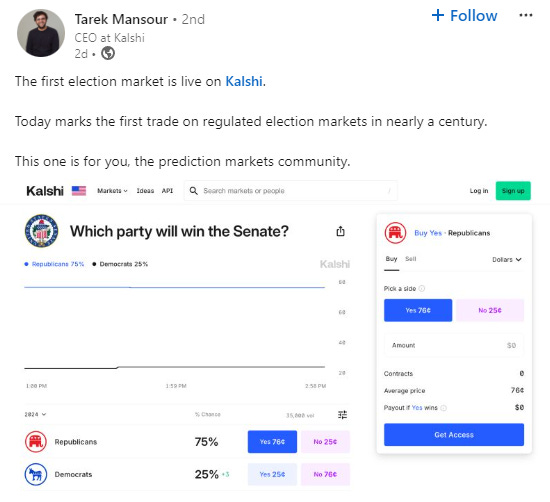Election Betting's Short Stint
Appeals court pulls the plug on Kalshi's foray into election betting after just a few hours. Now we wait for a more permanent decision.
The Bulletin Board
NEWS: Appeals court puts an end to election betting… for now.
WEEKEND CATCHUP: Fanatics goes live in DC; ROGA’s first RG initiative; A new PR company (with a familiar face).
NEWS: Missouri sports betting supporters tout the benefits of legalization ahead of November elections.
VIEWS: Industry slams the SAFE Bet Act as unnecessary government overreach.
BEYOND the HEADLINE: What’s in the SAFE Bet Act?
AROUND the WATERCOOLER: Prime + BVB = great partnership.
STRAY THOUGHTS: Thoughts on why mediocre to bad ideas are so popular.
SPONSOR’S MESSAGE - Sporttrade was borne out of the belief that the golden age of sports betting has yet to come. Combining proprietary technology, thoughtful design, and capital markets expertise, our platform endeavors to modernize sports betting for a more equitable, responsible, and accessible future.
Sporttrade’s newest feature, The Tape, prints all trades made on the app in real-time.
Appeals Court Puts Election Betting Back on Hold
After scoring a significant legal victory that led to Kalshi offering markets on US elections, the Court of Appeals for the District of Columbia Circuit has put the lid back on election betting. The court “issued an order Thursday night temporarily freezing the matter until it can consider and rule on the issue.”
US District Court of the District of Columbia Judge Jia Cobb ruled in favor of Kalshi in its lawsuit against the Commodity Futures Trading Commission, paving the way for election betting — Kalshi had sought permission to offer a market on which party would control Congress after the November elections.
“Election markets are now legal in the United States for the first time in 100 years,” Tarek Mansour, co-founder and CEO of Kalshi, said after the ruling.
The CFTC filed an emergency motion and will likely appeal the decision. The Appeals Court granted the motion, and to Kalshi’s dismay, its foray into election betting lasted just a few hours.
Sitting in the background is Congress, specifically a growing group of Democratic lawmakers who believe election betting threatens free and fair elections. Assuming Kalshi emerges victorious in the courts, we could see a push for Congressional action to end election betting.
For those interested in more of the backstory, you can read my deep dive into US election betting here.
Weekend Catchup: Fanatics Is Live in DC; ROGA’s First Initiative; New PR Company (with a familiar face)
Fanatics Sportsbook goes live in DC: DC sports bettors have yet another option as Fanatics is now live in the city. Fanatics’ entry into the DC market comes via a partnership with the National Women’s Soccer League’s Washington Spirit.
ROGA makes its first splash: The Responsible Online Gaming Association (ROGA) has teamed up with Kindbridge, EPIC Global Solutions, and the Responsible Gaming Council to create a comprehensive responsible online gaming and financial literacy education program aimed at college students. ROGA was formed in March by seven of the largest online gambling operators in the US. The group has a significant war chest (reported at $20 million), but this is its first initiative.
Read the full press release here
Rebecca McAdam Willetts launches PR company QUEENBHIVE: I’ve known Rebecca for many years, dating back to her long tenure at PokerStars. Anyone looking for PR or marketing would be wise to contact Rebecca, who is the perfect mix of passion and experience.
SPONSOR’S MESSAGE - Underdog: the most innovative company in sports gaming.
At Underdog we use our own tech stack to create the industry’s most popular games, designing products specifically for the American sports fan.
Join us as we build the future of sports gaming.
Visit: https://underdogfantasy.com/careers
Missouri Sports Betting Supporters Launch Ad Campaign
After a legal challenge failed to keep it off the November ballot, proponents of Missouri’s sports betting ballot initiative have released their first ad, highlighting that the measure will help fund education in the state.
The big questions are: what will the opposition ads look like, and which will resonate with Missouri voters?
The ballot measure is the result of several failed efforts by the Missouri legislature to legalize sports betting. The efforts were hampered by VGT supporters in the Senate, who insisted the legislature pass VGTs and sports betting in unison. When those arguments failed, they used the state’s filibuster rules to derail standalone sports betting legislation.
To bypass the legislature, Missouri’s professional sports betting teams and mobile betting operators launched a ballot initiative campaign that barely qualified.
Polling indicates a plurality of Missourians support legalization. Still, I wouldn’t put much stock in it until voters are inundated with favorable messages like the one above and opposition ads.
Those ads will come from several corners:
Problem gambling advocates
The VGT industry (who see sports betting as their ticket to legalization/regulation)
Pockets of the land-based casino industry
As I recently wrote, casinos could oppose the measure because “the language of the initiative has a unique structure, with licenses limited to each casino’s parent company, Missouri’s six professional sports teams, and two online-only licenses.”
“That language limits PENN Entertainment and Caesars to a single mobile betting skin, even though each company operates multiple casinos in the state.”
And, as Eilers & Krejcik Gaming (a newsletter sponsor) noted, “Both of the above parameters shift market access power in the direction of sports stadia and online operators in a policy climate that still generally favors gambling incumbents.”
Analyzing the “Why” Behind the SAFE Bet Act
One of the big stories last week was Rep. Paul Tonko's and Sen. Richard Blumenthal's announcement of the SAFE Bet Act during a press conference at the Capitol.
As Tonko said, the Supreme Court ruled that Congress has the ability to regulate gambling when it overturned PASPA. Tonko and Blumenthal want Congress to regulate sports gambling directly, as the SCOTUS said it could in its ruling, and set the ground rules, “the minimum standards needed.”
Tonko delivered a scorching line, equating sportsbooks to big tobacco, which he said was previously allowed to do whatever they wanted “so long as they pay for chemotherapy and hospice.” That line will likely be deployed as an attack against the industry opening its coffers for problem gambling funding: “Gambling sites can do whatever they want so long as they pay for counseling and funeral costs (linking gambling addiction and suicide).”
“Every single solitary moment of every sporting event across the globe has become a betting opportunity,” Rep. Tonko said during the press conference. “Sports betting ads are there to prompt you with an endless cascade of flashy promotions.”
Tonko said the ads have “reached intolerably dangerous levels,” with bettors encouraged to wager on every pitch, snap, and play.
And here’s a great quote from Sen. Blumenthal on the “why” of the SAFE Bet Act, noted by Steve Bittenbender:
“State regulation is faint-hearted and half-baked. That’s why we need a national standard. Not to ban gambling, but simply to take back control over an industry that is out of bounds, literally operating outside the bounds of decency and respectability.”
There’s not much expectation from the pundit class in Congress doing more than talking, but the industry is certainly taking it seriously.
The American Gaming Association and iDEA Growth both issued statements repudiating the SAFE Bet Act, as did Rep. Dina Titus the co-chair of the Congressional Gaming Caucus, who said:
“The SAFE Bet Act reinforces the outdated and unwarranted prejudice against gaming, a legal industry which provides good-paying jobs and tax dollars to communities across the United States. While the SAFE Bet Act is perhaps well-intentioned, pre-empting state gaming regulators by outlawing most forms of advertising and restricting the types and methods by which customers can place bets is a misguided approach.”
Beyond the Headline: What’s in the SAFE Bet Act
So, what is in the SAFE Bet Act?
The SAFE Bet Act mixes good, bad, and meh ideas.
The bill restricts advertising (a blackout from 8 AM to 10 PM and during live sporting events), prohibits college player prop bets, bans credit cards, limits the use of AI to target bettors, and creates a national self-exclusion database.
The SAFE Bet Act also limits bettors to five deposits in a 24-hour period and requires affordability checks on deposits of $1,000 or more in a 24-hour period or $10,000 or more over 30 days.
Further, states are required to submit their sports betting proposals to the US Attorney General for review. States would need to reapply every three years.
The bill also mandates reports from the Substance Abuse Mental Health Services Administration (SAMHSA), the Surgeon General’s office, and the Center for Disease Control.
SPONSOR’S MESSAGE - Join 100s of operators automating their trading with OpticOdds.
Real-time data. Proven trading tools. Built by experts. Meet us at SBC Lisbon & G2E Vegas. Join top operators at www.opticodds.com.
Around the Watercooler
Social media conversations, rumors, and gossip.
Two “friends of the newsletter” Prime Sports and the Bostonian Vs. the Book show (Sportbook Consigliere and Matt Perrault) have inked a sponsorship deal.
Sporttrade (a newsletter sponsor) CEO Alex Kane is already a weekly guest on the BVB program.
Stray Thoughts
There are two dominant types of martial arts schools - mediocre (inadequate) instruction run by great business people and great instruction run by bad business people. The overlap between good instruction and good business acumen is almost as small as what should be disqualifying: mediocre (inadequate) instruction and bad business acumen.
Even though there are as many as or more schools with good instruction that lack business sense, most people end up at a school with mediocre (inadequate) instruction and a good head on their shoulders for business. Students often believe they are getting excellent instruction because they don't know any better.
I would posit that the responsible gambling field is similarly populated. There are a lot of really good salespeople running around with mediocre/boilerplate ideas, and they are drowning out the people with terrific ideas that aren’t ticking off the specific boxes that we’ve been led to believe are important.









